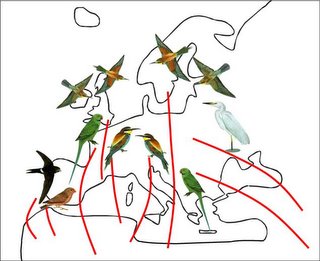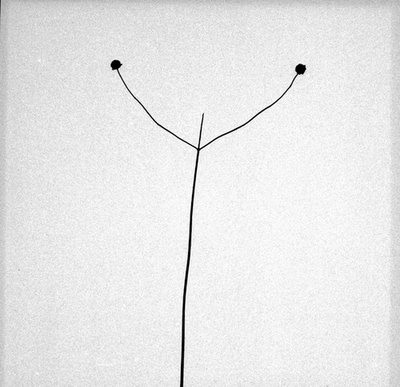
Anybody who knows me knows that long stretches of vigorous, transformative travel are what I hanker for. There is nothing like the feeling of moving rootlessly through the world, living on your wits, not being defined by a fixed context, a fixed identity, a fixed worldview. I've often thought that something I would be good at is ungluing unhappy people from their own fixed conditions and helping them to find some other self, some more enriching way of being, while knocking around the globe with them. These would have to be some real risktakers, people who might feel that their life has become a vessel for repetitive, dolorous pain and unfulfilled fantasy, and who are willing to let go of what they've got.
Travel Therapy (TM) I call it. I have found that sharing the commotion and momentum of travel with another human (or small group of them) is a good way to grow. Combine the walking and talking, the serendipity and adventure, the perpetual intersplicing of the familiar and the alien, the loneliness and the exhaustion, and pretty soon the binding on one's inner chaos knocks loose and begins to echo the chaos of meandering the continents. Terrifying at first, but the rewards of finding a sort of equilibrium with the world come quickly. In my own travels I have felt the awakening of something like a "core" being and found those elusive sparks of vitality we all crave.
Bing and Bob knew that life on the road was where it's at.
Travel Therapy would offer troubled and
isolated people a taste of wanderlust. A yearning for other worlds accompanied by the character and wearwithal to participate in them. Sure there are the sites and the marvels, the horrors and the dangers, and all the less spectacular stretches in between. Yes there is the exotica: the temples of Angkor, the tombolos of Cape Town, the blue hues of the South Pacific, the Mayan ruins, the "fish cure" of Hyderabad, the Japanese tea ceremonies, the orgies of Prague, the sea turtles of the Galapagos and so on. Yes, you will meet the people, smell the smells, savor the details in vivid color. But the point of Travel Therapy is not to lose yourself in the stuff of the world, but on the contrary, to discover a higher sense of self - a worldly self - a nuanced and robust ego that can adapt to change, openly observe, think deep, act fast and laugh hard, wherever, whenever... More on this later. My breakfast is ready.
OK I'm back. (Salmon crepes. Delicious. Find a partner who can cook and you'll always have something delicious to look forward to.) A full stomach takes the
Alain de Botton out of a man and replaces him with Don Rickles.
So. In the "platinum" version of Travel Therapy you will be accompanied by a carefully selected coterie of experts - what may seem like a bizarre and rag tag group at first, but ultimately the perfect match for your deepest needs (as determined by exhaustive, diagnostic pre-interviews as administered by a panel of debunked Korean scientists and retired deities). Your team will include: A shrink (from your chosen school of psychology), a shaman, a scientist, an writer/aphorist/photographer, a geographer/historian/portraitist, a physical therapist/nutritionist, a body guard (who sings opera), a negative provocateur/contrarian (aka "the lovable scapegoat") and a personal friend. I too would come along as a sort of gestalt-ifying generalist in jodhpurs. (
The Millionaire and his wife would be available for an extra fee.)
In addition to providing excellent company, education and a variety of good (and opinionated) ears, this group would assign site specific challenges, tasks, and homework along the way: sleep tonight on this beach, engage that person in a philosophical conversation, steal that loaf of bread, give that person a hug and a kick in the shin, read this book, dine with that policeman, paint that corn field, volunteer in that hospice, climb over that wall, etc. Don't think "Fear Factor" though. These challenges would occur at random intervals and are not superficial exercises in sensationalism for the benefit of couchbound voyeurs. These are tailor-made experiences that will make you angry and doubtful and resentful at first. There are no safety nets or easy outs. There are no commercial breaks. This is your life.
OF course the "platinum" service is wildly expensive. And worth it! It's life-changing results are permanent and will vastly outperform any other
fixative or
self-help the modern world has to offer. Start saving now. Or...
On the other side of the Travel Therapy coin, is the far more intensive and rewarding "budget" version. Here you will be approached unannounced while opening your front door one evening. You will be chloroformed into a deep relaxing sleep. You will wake up naked in the airport parking lot of a remote location such as Ulaan Bator. You will have 1200 Mongolian tugrogs (approx. US $1) taped to your forehead. Good luck!



































